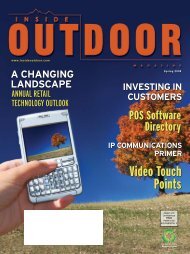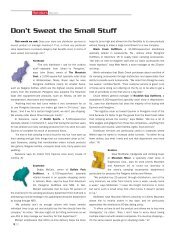Fall - InsideOutdoor Magazine
Fall - InsideOutdoor Magazine
Fall - InsideOutdoor Magazine
You also want an ePaper? Increase the reach of your titles
YUMPU automatically turns print PDFs into web optimized ePapers that Google loves.
Back Office<br />
Minding Your Own Business<br />
by Bill Taylor<br />
How many times have you heard someone say “mind your<br />
own business”? If you are the owner of a retail business,<br />
that may just be a reason to say, “Thank you – Come again!”<br />
We have seen many retail business owners get so wrapped<br />
up “in the business,” stocking shelves, contacting vendors,<br />
scheduling employees, etc., that they never seem to spend<br />
any time working “on the business,” often leading to missed<br />
opportunities or disastrous results.<br />
While it is easy to get caught up in the daily ins and outs<br />
of the retail business, especially in smaller stores, finding a<br />
good balance is key. That is not to say you shouldn’t focus your<br />
energies toward finding and selling customers, implementing<br />
inventory and financial systems and providing excellent<br />
customer service and product support, but a single-minded<br />
approach toward always working “in the business” may be<br />
holding your business back and keeping your profits down. We<br />
believe successful retailers, especially those who also happen<br />
to own the business, must make the time each and every<br />
month to work “on the business.”<br />
What do we actually mean when we say work “on the<br />
business?” This includes changing your perspective by taking a<br />
bird’s eye view and really looking objectively at all key areas of your<br />
business – from how you sell to customers, market your products,<br />
manage people and layout your aisles to a complete financial<br />
review. It includes looking beyond today to allow you to plan for<br />
growth, analyze trends, evaluate new products and product lines,<br />
develop deeper vendor relationships and so much more that could<br />
easily get missed while you’re redecorating your windows for the<br />
holiday season or handling a customer complaint.<br />
Getting Started<br />
A great way to get started working “on the business” is<br />
by developing a basic business plan. Your initial business plan<br />
does not need to be deeply thought through or encyclopedic<br />
in nature. In fact, if you’re just starting out, or if this is your<br />
first time putting together a business plan, less is more when it<br />
comes to developing the plan. A few pages, with a maximum of<br />
five, should probably do it. Your business plan needs to include<br />
what products you plan to sell and who your key suppliers will<br />
be; markets you intend to reach; primary target customers; how<br />
you will reach your customers; methods to recruit, hire and train<br />
employees; customer support programs and procedures; and<br />
most importantly your financial plan, including a projected profit<br />
and loss (P&L). Creating key performance indicators (KPIs) is<br />
another excellent way to establish metrics for your business.<br />
The next requirement is to make time available every<br />
month. We recommend that you spend at least a minimum of<br />
eight hours every month working on your business. Another<br />
good idea is to pre-schedule your calendar to block out this time<br />
each and every month for this work. Employees and suppliers<br />
requesting time to meet with you should be told that you have<br />
a prior commitment and you’ll gladly meet with them at another<br />
time. If finding a full day to dedicate to your business is difficult,<br />
try scheduling two half days or maybe two hours a week, if that<br />
works better for you. The importance lies in making the time<br />
investment each and every month, not whether it is done in a<br />
few short time periods or one long one.<br />
Weekly meetings or conference calls with staff also are a<br />
good way to work on the business. This can be a challenge in a<br />
retail environment where employee schedules are often diverse<br />
and flexible, so you need to be aware of when you can gather<br />
a majority of your people for these sessions, either in person<br />
or by phone, whichever works best. A good idea is to schedule<br />
meeting times in advance, preferably the same day and time<br />
each week, if possible, when you know you’ll have uninterrupted<br />
time with your key employees to discuss the business. Develop<br />
an agenda to be sure you cover the important items and metrics<br />
in every meeting. Timeliness is important, so be ready at the<br />
appointed time and don’t allow others to miss your meeting or<br />
be late. During your sessions review your business objectives<br />
and measure progress against the targets. Ask questions and<br />
challenge the answers you receive.<br />
Mind Your Numbers<br />
Discussing the financial elements is critical. Not every<br />
business person is financially savvy, but every smart business<br />
person needs to learn and understand the basic financials of<br />
successfully running their business. If necessary, ask for outside<br />
help in this critical area. If you don’t have a financial person on<br />
staff, look to a trusted business advisor, or your accountant/CPA<br />
to explain the numbers and the information they provide. Have<br />
them work with you to spot trends and patterns for your store<br />
and for the product lines in your store and ask questions about<br />
profits, margins and expenses. Learn how to read your P&L data<br />
and be able to tell what is going on in your business every month.<br />
It is also important to create an annual expense budget for your<br />
business at the beginning of the year and then stick to it!<br />
Don’t let the issues or problems of the day suck you in and<br />
become your single focus. While you must be involved in building<br />
and running the business, it shouldn’t be the only thing you do.<br />
Minding your own business is not only a great idea, it is essential,<br />
and you should thank everyone that reminds you to do so. After<br />
all, if you don’t mind your own business – who else will?<br />
Bill Taylor is the founder and president of Corporate Ladders,<br />
(www.corporateladders.com) specializing in management,<br />
sales and business development consulting and coaching<br />
for businesses and individuals that want to get to the top.<br />
Bill can be reached at wbtaylor@corporateladders.com or at<br />
201.825.8296.<br />
48 | <strong>InsideOutdoor</strong> | <strong>Fall</strong> 2008
















